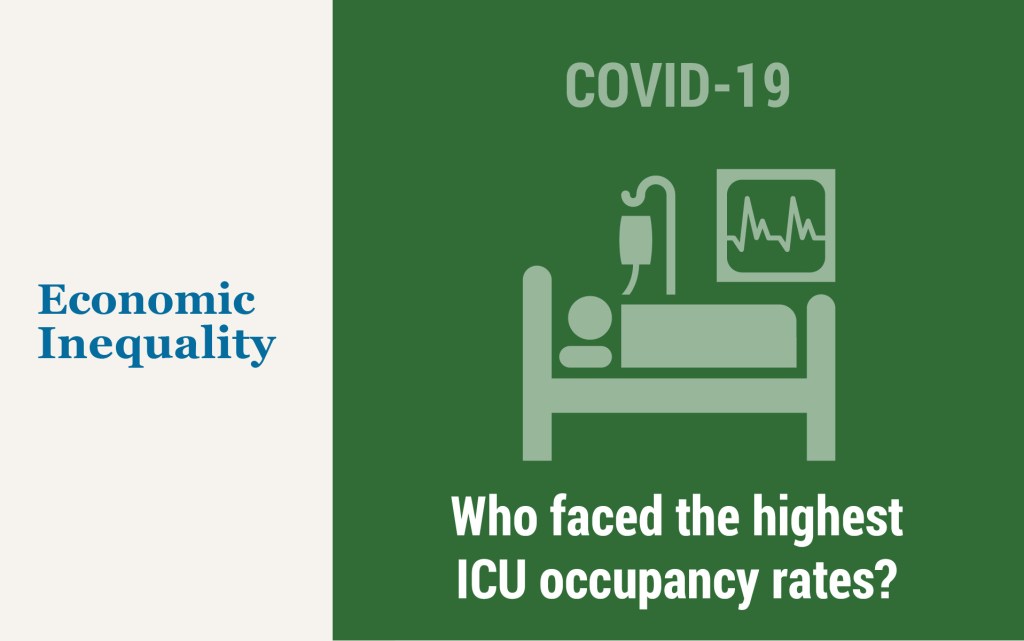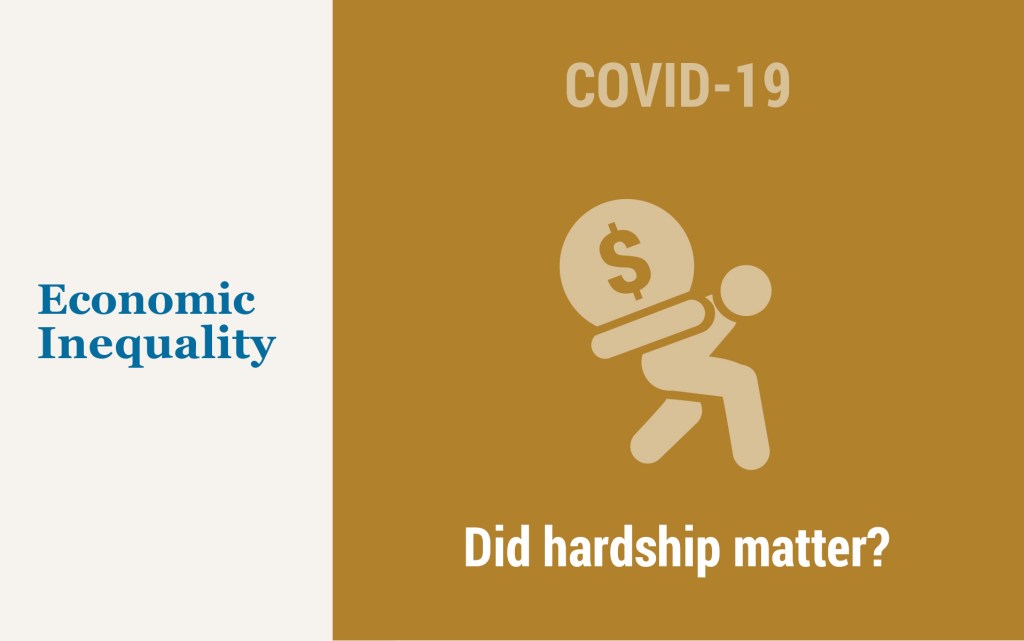
This post presents an update of the economic forecasts generated by the Federal Reserve Bank of New York’s dynamic stochastic general equilibrium (DSGE) model. We describe very briefly our forecast and its change since June 2021.
At the New York Fed, our mission is to make the U.S. economy stronger and the financial system more stable for all segments of society. We do this by executing monetary policy, providing financial services, supervising banks and conducting research and providing expertise on issues that impact the nation and communities we serve.
Marco Del Negro, Keshav Dogra, Shlok Goyal, Alissa Johnson, and Aidan Gleich

This post presents an update of the economic forecasts generated by the Federal Reserve Bank of New York’s dynamic stochastic general equilibrium (DSGE) model. We describe very briefly our forecast and its change since June 2021.
Olivier Armantier, Fatima Boumahdi, Leo Goldman, Gizem Koşar, Jessica Lu, Giorgio Topa, and Wilbert van der Klaauw

With the recent surge in inflation since the spring there has been an increase in consumers’ short-run (one-year ahead) and, to a lesser extent, medium-run (three-year ahead) inflation expectations (see Survey of Consumer Expectations). Although this rise in short- and medium-run inflation expectations is relevant for policymakers, it does not provide direct evidence about “un-anchoring” of long-run inflation expectations. Roughly speaking, inflation expectations are considered un-anchored when long-run inflation expectations change significantly in response to developments in inflation or other economic variables, and begin to move away from levels consistent with the central bank’s (implicit or explicit) inflation objective. In that case, actual inflation can become unmoored and risks drifting persistently away from the central bank’s objective. Well-anchored long-run inflation expectations therefore represent an important measure of the success of monetary policy. In this post, we look at the current anchoring of consumers’ long-run inflation expectations using novel data from the Survey of Consumer Expectations (SCE). Our results suggest that in August 2021 consumers’ five-year ahead inflation expectations were as well anchored as they were two years ago, before the start of the pandemic.
Jason Bram and Joelle Scally

As we mourn the tragic losses of the 9/11 attacks twenty years on, we thought it would be appropriate to re-examine the remarkable resilience New York City’s economy has shown over the years—a resilience that is once again being tested by the ongoing COVID-19 pandemic. In this Liberty Street Economics post, we look at how Lower Manhattan, in particular, has changed since that tragedy on a number of dimensions, and use that as a framework to think about how the city might change as a result of the COVID pandemic.
Andrew Haughwout and Belicia Rodriguez

In our previous post, we illustrated the recent extraordinarily strong growth in home prices and explored some of its key spatial patterns. Such price increases remind many of the first decade of the 2000s when home prices reversed, contributing to a broad housing market collapse that led to a wave of foreclosures, a financial crisis, and a prolonged recession. This post explores the risk that such an event could recur if home prices go into reverse now. We find that although the situation looks superficially similar to the brink of the last crisis, there are important differences that are likely to mitigate the risks emanating from the housing sector.
Andrew Haughwout and Belicia Rodriguez

House prices have risen rapidly during the pandemic, increasing even faster than the pace set before the 2007 financial crisis and subsequent recession. Is there a risk that another dangerous housing bubble is developing? This is a complicated question, and the answer has many components. This post, the first of two, provides a more detailed look at the recent rise in home prices by breaking it down geographically, with a comparison to the pre-2007 bubble. The second post looks at the potential risks to financial stability by comparing the currently outstanding stock of mortgage debt to the period before the financial crisis and projecting defaults should prices decline.
Haoyang Liu, David Lucca, Dean Parker, and Gabriela Rays-Wahba

During the pandemic, national home values and housing activity soared as mortgage rates declined to historic lows. Under the canonical “user cost” house price model, home values are held to be very sensitive to interest rates, especially at low interest rate levels. A calibration of this model can account for the house price boom with the observed decline in interest rates. But empirically, we find that home values are nowhere near as sensitive to interest rates as the user cost model predicts. This lower sensitivity is also found in prior economic research. Thus, the historical experience suggests that lower interest rates can only account for a tiny fraction of the pandemic house price boom. Instead, we find more scope for lower interest rates to explain the rise in housing activity, both sales and construction.
Nicola Cetorelli, Michael G. Jacobides, and Samuel Stern

Does the performance of banks improve or worsen when banks enter into new business activities? And does it matter which activities a bank expands into, or retreats from, and when that decision is made? These important questions have remained unaddressed due to a lack of data. In a recent publication, we used a unique data set detailing the organizational structure of the entire population of U.S. bank holding companies (BHCs). In this post, we draw on that research to show that while scope expansion on average hurts performance, entering into activities that are highly synergistic with core banking at a given point in time yields net performance benefits.
Ruchi Avtar, Rajashri Chakrabarti, and Maxim Pinkovskiy

A critical risk during the COVID-19 pandemic has been the possibility of the hospital system becoming overwhelmed. COVID-19 not only has killed nearly 2 percent of people with confirmed infections but causes many more who contract it to develop severe complications that are potentially fatal if not treated in an intensive care unit (ICU). As ICU capacity is based on typical needs for intensive care before the pandemic, a surge of COVID-related ICU patients may leave no room for individuals requiring intensive care for other reasons—such as heart attacks—or may exceed the total ICU capacity to treat even COVID-19 patients. In this post, we investigate the extent to which members of different racial and ethnic groups faced different levels of hospital system stress during the “third wave” of COVID-19 in the winter of 2021, which, as the largest wave to hit the United States, briefly brought intensive care units around the country to the point of being overwhelmed. We find that while Black and Hispanic individuals faced the greatest exposure to overburdened ICUs over the course of the third wave from beginning to end, Asian American and Pacific Islanders (AAPI) went from experiencing more stable ICU capacities than the national average at the beginning of the wave to a nearly overwhelmed ICU system at its peak.
Andrew Haughwout, Donghoon Lee, Joelle Scally, and Wilbert van der Klaauw

The Federal Reserve Bank of New York’s Center for Microeconomic Data today released its Quarterly Report on Household Debt and Credit for the second quarter of 2021. It showed that overall household debt increased at a quick clip over the period, with a $322 billion increase in balances, boosted primarily by a 2.8 percent increase in mortgage balances, a 2.2 percent increase in credit card balances, and a 2.4 percent increase in auto balances. Mortgage balances in particular were boosted by a record $1.22 trillion in newly originated loans. Although some borrowers are originating new loans, struggling borrowers remain in forbearance programs, where they are pausing repayment on their debts and creating an additional upward pressure on outstanding mortgage balances.
Rajashri Chakrabarti, Jessica Lu, Joelle Scally, and Wilbert van der Klaauw

Forbearance on debt repayment was a key provision of the CARES Act, legislation intended to combat the widespread economic losses stemming from the COVID-19 pandemic. This pause on required payments for federally guaranteed mortgages and student loans has provided temporary relief to those affected by the COVID-19 pandemic, and servicers of nonfederal loans often provided forbearances or other relief on request as well. Here, using a special survey section fielded with the August 2020 Survey of Consumer Expectations, we aim to understand who benefitted from these provisions. Specifically, were there differences by age, race, income, and educational background? Did individuals who suffered job or income losses benefit differentially? Did renters receive more or less nonhousing debt relief than homeowners? Answers to these questions are not only key for understanding the economic recovery and implications for inequality and equitable growth, they can provide important insight into the expected effects of more recent and potential future legislation.
Liberty Street Economics features insight and analysis from New York Fed economists working at the intersection of research and policy. Launched in 2011, the blog takes its name from the Bank’s headquarters at 33 Liberty Street in Manhattan’s Financial District.
The editors are Michael Fleming, Thomas Klitgaard, Maxim Pinkovskiy, and Asani Sarkar, all economists in the Bank’s Research Group.
Liberty Street Economics does not publish new posts during the blackout periods surrounding Federal Open Market Committee meetings.
The views expressed are those of the authors, and do not necessarily reflect the position of the New York Fed or the Federal Reserve System.
We encourage your comments and queries on our posts and will publish them (below the post) subject to the following guidelines:
Please be brief: Comments are limited to 1,500 characters.
Please be aware: Comments submitted shortly before or during the FOMC blackout may not be published until after the blackout.
Please be relevant: Comments are moderated and will not appear until they have been reviewed to ensure that they are substantive and clearly related to the topic of the post.
Please be respectful: We reserve the right not to post any comment, and will not post comments that are abusive, harassing, obscene, or commercial in nature. No notice will be given regarding whether a submission will or will
not be posted.
Comments with links: Please do not include any links in your comment, even if you feel the links will contribute to the discussion. Comments with links will not be posted.
The LSE editors ask authors submitting a post to the blog to confirm that they have no conflicts of interest as defined by the American Economic Association in its Disclosure Policy. If an author has sources of financial support or other interests that could be perceived as influencing the research presented in the post, we disclose that fact in a statement prepared by the author and appended to the author information at the end of the post. If the author has no such interests to disclose, no statement is provided. Note, however, that we do indicate in all cases if a data vendor or other party has a right to review a post.
